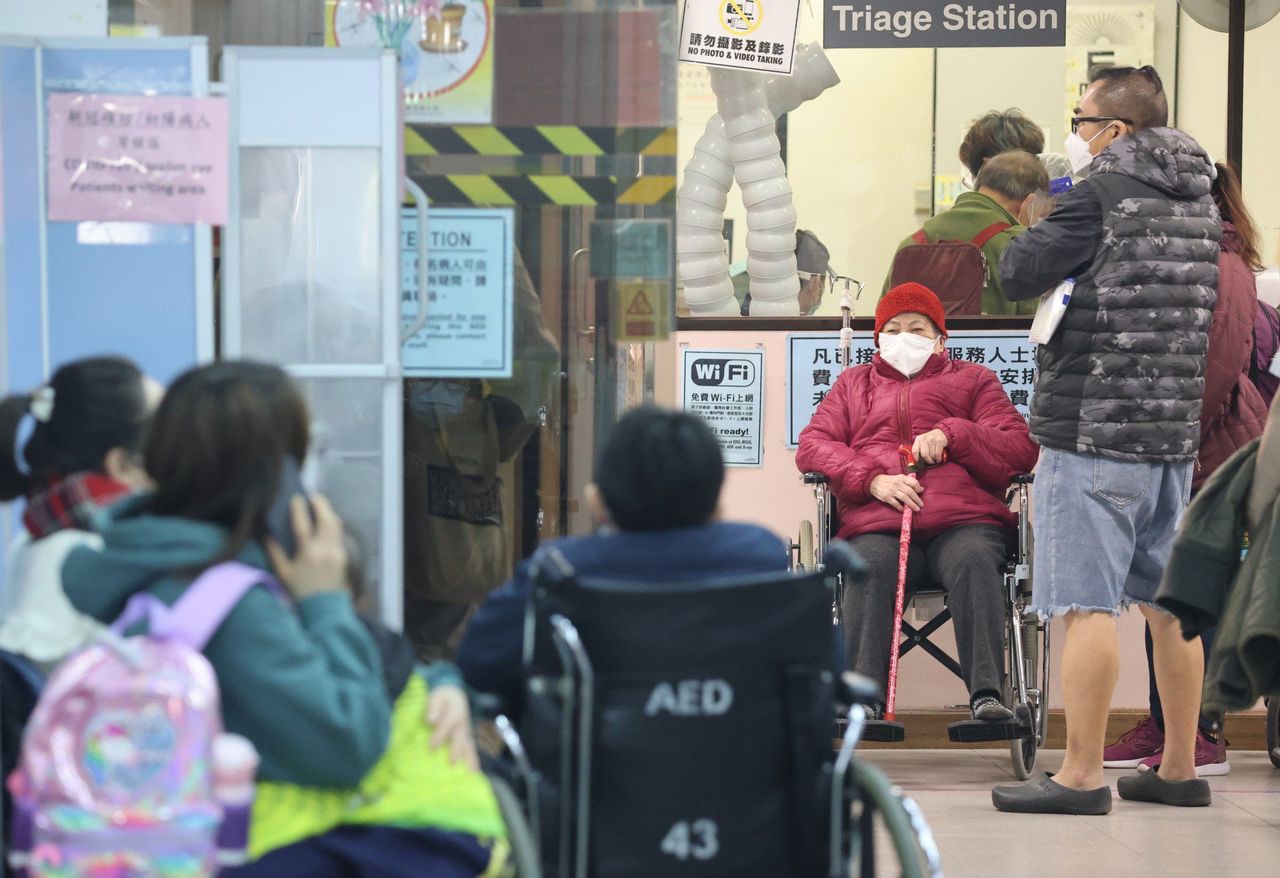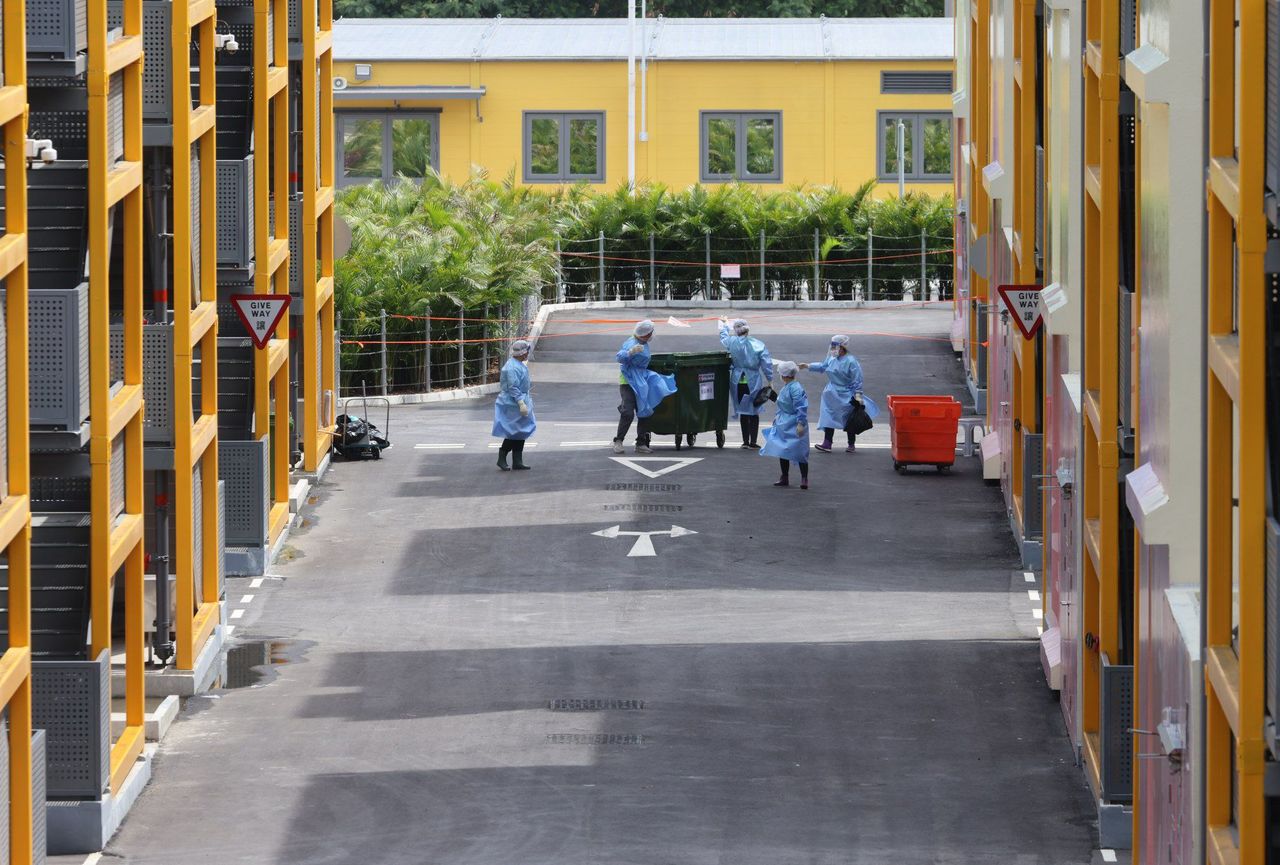Extra hospital beds and manpower will be added to cope with an influx of people at public health facilities, Hong Kong authorities say.
Close contacts of Covid-19 patients at care homes for the elderly in Hong Kong will no longer be sent to quarantine centres, while extra hospital beds and manpower will be added to cope with a potential influx of people at public health facilities, authorities have said.
The government on Thursday announced the new measures in response to patients swarming public hospitals in recent weeks, with one health expert saying adjustments should have been made earlier.
More than 1,600 residents from care homes for the elderly have been diagnosed with Covid-19 in the past week amid the recent surge of infections locally.
 Patients wait in the accident and emergency area of United Christian Hospital in Kwun Tong.
Patients wait in the accident and emergency area of United Christian Hospital in Kwun Tong.
Grace Li Fai, an executive council member of the Elderly Services Association of Hong Kong, welcomed the measures, saying it was pointless to move the elderly “back and forth” between facilities.
“The new measure will allow more beds for infected elderly, as close contacts will no longer be occupying them. This is an excellent adjustment to reserve limited resources for those who are most in need.”
Hong Kong on Thursday reported 19,705 new coronavirus infections, 954 of which were imported, and 34 deaths, bringing the total tally to 2,421,943 cases and 11,327 fatalities.
To avoid cross-transmission at care facilities, 10 holding centres were opened earlier to isolate infected care home residents with mild or no symptoms. Around half of the beds were occupied as of Thursday.
The department will convert three more halls at AsiaWorld-Expo, which were previously quarantine facilities for close contacts, to holding centres from Saturday. A total of 2,487 beds would be available in all centres.
The Hospital Authority also said additional manpower, beds and resources would be arranged during the Christmas holidays, in anticipation of higher numbers of patients in emergency units and extra admissions during the cold weather.
It would also ramp up support for hospital emergency departments, as well as designated clinics and telemedicine services for Covid-19 patients, encouraging non-urgent ones to visit public or private clinics instead.
Infectious disease expert Dr Leung Chi-chiu said the government should have closed quarantine centres for close contacts from care homes sooner, adding that moving elderly residents often involved a lot of manpower.
“When patient numbers rose, facilities showed signs of trouble and confirmed Covid-19 patients could no longer be sent away quickly, it should have been considered at that stage to only isolate those positive cases,” he said.
Around 20 per cent of more than 4,100 hospitalised Covid-19 patients were from homes for the elderly as of Tuesday, while the latest occupancy rate at public hospitals had surged to 110 per cent.
Industry representative Li said the homes would only send elderly people with serious symptoms, such as high blood pressure or blood sugar levels, to emergency departments.
But she said since late November, when infections began to increase, there were not enough beds in holding centres, forcing homes to send infected residents directly to public hospitals.
“It once took four days to transfer infected residents to holding centres,” she noted, saying she expected the situation to improve under the new measures.
Kenneth Chan Chi-yuk, chairman of the same association, said despite the recent outbreaks at care homes, it was “a lot better” than the fifth wave of pandemic in March when hospitals were swamped with infected elderly, forcing some to wait outdoors in the cold weather.
He explained that support such as holding centres, teleconsultations and antiviral pills were available now, and there was no shortage of manpower as only two to three, instead of many, staff were likely to contract the virus at the same time.
 Kai Tak quarantine centre had been used for close contacts of care home patients.
Kai Tak quarantine centre had been used for close contacts of care home patients.
Emergency departments at public hospitals on Thursday saw generally shorter wait times of between one and three hours during the day, though patients at Pamela Youde Nethersole Eastern Hospital in Chai Wan and United Christian Hospital in Kwun Tong still faced waits of more than eight hours in the morning.
At United Christian Hospital, the waiting hall was packed with patients – most of whom were elderly – and their carers at around noon on Thursday.
Space was tight and at one point – because the hallway was blocked by a bed with a patient on it – ambulance workers were unable to offload two new arrivals until hospital staff came to move the bed 15 minutes later.
The Fire Services Department on Thursday also appealed for proper use of the ambulance service to conserve resources for people in urgent need, as it had received on average 2,800 daily calls in the past three days.
Meanwhile, starting on Thursday, residents, including children, would be given priority to receive BioNTech’s Omicron-specific coronavirus vaccine and the child version. The German-made bivalent vaccine targets the subvariants BA.4 and BA.5.
The government also said that BioNTech and Sinovac vaccine suppliers in Hong Kong could soon be able to supply private healthcare professionals, allowing them to administer vaccines in the private market outside the government vaccination programme.
A spokesman said the government would also review the coronavirus inoculation programme next year, including whether it was necessary to regularise vaccination.















